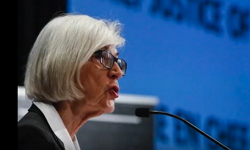This study offers an in-depth analysis of how emotional labor influences job burnout and the intention to leave among employees in the hotel industry. The research design is grounded in existing literature and theoretical discourse, dissecting various...
http://chineseinput.net/에서 pinyin(병음)방식으로 중국어를 변환할 수 있습니다.
변환된 중국어를 복사하여 사용하시면 됩니다.
- 中文 을 입력하시려면 zhongwen을 입력하시고 space를누르시면됩니다.
- 北京 을 입력하시려면 beijing을 입력하시고 space를 누르시면 됩니다.

호텔 산업 종사자의 감정노동이 직무소진과 이직의도에 미치는 영향-성별의 조절효과 분석- = The Influence of Emotional Labor on Job Burnout and Turnover Intentions Among Hotel Industry Employees-Analysis of the Moderating Effect of Gender-
한글로보기https://www.riss.kr/link?id=A108919570
- 저자
- 발행기관
- 학술지명
- 권호사항
-
발행연도
2023
-
작성언어
Korean
- 주제어
-
등재정보
KCI등재
-
자료형태
학술저널
-
수록면
71-87(17쪽)
- DOI식별코드
- 제공처
-
0
상세조회 -
0
다운로드
부가정보
다국어 초록 (Multilingual Abstract)
This study offers an in-depth analysis of how emotional labor influences job burnout and the intention to leave among employees in the hotel industry. The research design is grounded in existing literature and theoretical discourse, dissecting various components of emotional labor, psychological aspects of job burnout, and the internal mechanisms behind the intention to leave. Furthermore, it examines the modulating role of gender in these relationships. For the methodology, structural equation modeling is employed to analyze the data. This technique is a statistical approach that deciphers complex causal relationships between variables and unveils hidden patterns or structures. Through this method, the study accurately measures the interplay between emotional labor, job burnout, and the intention to leave, highlighting the role of gender in these dynamics. One key finding is that a component of emotional labor, known as "surface acting," significantly contributes to increasing job burnout. This aspect is directly linked to the amount of stress employees face, which, in turn, substantially impacts their intention to leave. Interestingly, it was revealed that male employees experience greater levels of job burnout and a higher intention to leave in these circumstances. These insights are crucial for developing human resource management strategies within the hotel industry. They underscore the need for educational programs and support systems related to emotional labor, contributing to enhanced job satisfaction and reduced turnover intentions. However, this study is not without its limitations, including a constrained sample size, the absence of participants from diverse demographic backgrounds, and the intricacies of the research design. Future research should overcome these issues, aiming for a more nuanced understanding of the relationships between emotional labor, job burnout, and the intention to leave within the hotel industry. This entails engaging a broader participant pool and considering various contexts to enrich the comprehension and applicability of the findings. By addressing these areas, subsequent studies can offer comprehensive insights and practical recommendations for industry stakeholders, potentially leading to healthier work environments and improved employee retention.
동일학술지(권/호) 다른 논문
-
외식기업의 콜라보레이션 특성이 브랜드차별화와 경영성과에 미치는 영향
- 한국외식산업학회
- 이용철
- 2023
- KCI등재
-
디저트카페 소비자의 감성적 소비가치, 소비감정, 소비성향, 소비행복의 구조적분석
- 한국외식산업학회
- 채동진
- 2023
- KCI등재
-
- 한국외식산업학회
- 강석우
- 2023
- KCI등재
-
- 한국외식산업학회
- 채경연
- 2023
- KCI등재




 KCI
KCI DBpia
DBpia






